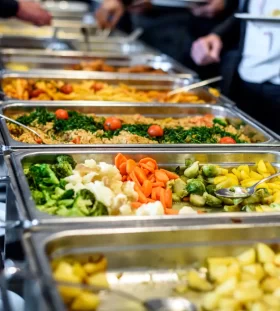Post-Pandemic Changes in Corporate Catering
Corporate catering, like most industries, wasn’t immune to the upheaval caused by the COVID-19 pandemic. This pivotal period reshaped our day-to-day lives and the ways businesses operate, ushering in significant changes in the corporate catering landscape.
As we transition into the post-pandemic era, these shifts are becoming more evident. While some changes were abrupt, others evolved gradually as caterers adapted to new demands and restrictions.
Let’s delve into how the corporate catering industry has navigated this unprecedented time and the transformative changes that emerged from it.
Corporate Catering: Pre and During Pandemic
Corporate catering was thriving pre-pandemic. Companies relied heavily on catering services for regular office meals, corporate events, and client meetings. Full-service catering was the norm, with buffets, sit-down meals, and interactive food stations being commonplace at corporate events.
However, the onset of the pandemic introduced a sea change. With lockdowns, social distancing, and a massive shift to remote work, traditional corporate catering was put on hold. But the industry didn’t stand still; it evolved and adapted.
Corporate catering software became instrumental in this transition. These digital platforms enabled caterers to manage orders, track deliveries and maintain customer relations effectively.
Menus were digitized, making them accessible and easy to customize, and home delivery options were integrated into the services.
Caterers started offering individually packed meals, virtual event catering, and even home delivery services for remote workers. Health and safety protocols became paramount, with rigorous sanitation measures, contactless delivery, and digital menus becoming standard practice.
Corporate catering software played a pivotal role in implementing these changes swiftly, ensuring the industry could adapt and thrive, despite the challenges.
Table of Contents
Post-Pandemic Changes in Corporate Catering
As we move into the post-pandemic era, these adaptations have given rise to notable shifts in corporate catering.
Firstly, individually packed meals are here to stay. These meals align with the continued emphasis on health and safety and cater to the flexible work arrangements many companies are now adopting.
Secondly, technology has become integral to corporate catering. Online ordering, contactless payments, and digital menus have not only enhanced safety but also improved efficiency and customer experience.
Thirdly, caterers are now offering more diverse and flexible menus to cater to the increased demand for healthy, dietary-specific, and locally sourced food.
These changes have been driven by several factors, including continued health concerns, flexible work arrangements, the rise of virtual events, and changing consumer preferences towards health and sustainability.
Case Study: A Successful Adaptation
Consider ‘The Healthy Gourmet’, a prime example of a corporate catering service that has effectively overcome the challenges brought about by the pandemic.
Before the pandemic, ‘The Healthy Gourmet’ was a thriving name in the corporate catering industry, particularly well-regarded for its buffet services. The pandemic initially dealt a harsh blow to their operations. However, they chose to adapt rather than succumb.
Harnessing the power of the Flex Catering software, they transitioned towards providing individually packed meals, inaugurated a user-friendly online ordering system, and focused on incorporating local, organic ingredients into their offerings. They enhanced their service with contactless delivery and digital menus to promote safety and convenience.
Their resilient approach bore fruit. Not only did ‘The Healthy Gourmet’ recover, but it also flourished, demonstrating an impressive ability to innovate and adjust to the changing landscape.
This success story serves as a testament to the potential for corporate caterers to not just survive, but indeed thrive in the post-pandemic world through the strategic use of modern solutions like Flex Catering software and the willingness to embrace change.
The Future of Corporate Catering
Looking ahead, these post-pandemic changes are likely to persist and shape the future of corporate catering.
Individually packed meals, contactless services, and digital solutions will continue to be the norm. We can also expect a greater emphasis on dietary-specific and locally sourced food, driven by increased consumer awareness about health and sustainability.
Moreover, as businesses adopt hybrid work models, corporate caterers will need to offer more flexible and diverse services, catering to both on-site and remote employees.
Overall, the future of corporate catering will be characterized by flexibility, innovation, and an unwavering commitment to health and safety.
Conclusion
As we step into this new era of corporate catering, replete with individually packed meals and advanced digital solutions, it’s clear that adaptability and innovation are key. The tale of ‘The Healthy Gourmet’ isn’t just an inspiring story; it’s a template for survival and prosperity in a post-pandemic world.
For those in the corporate catering industry, these changes aren’t mere hurdles. Instead, they are pathways to innovation, growth, and a chance to redefine the catering experience. And with a partner like Flex Catering by your side, this task becomes even more manageable.
With our top-tier corporate catering software, we equip you with the tools you need to embrace and capitalize on these transformations. So why wait? Contact Flex Catering today, and let’s shape the future of corporate catering together.
I believe in creativity and try to express the same with my words. I enjoy writing and keeping myself in touch with the books.

